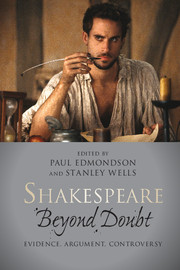Afterword
Published online by Cambridge University Press: 05 April 2013
Summary
In September 2011, a friend who teaches at a small college in upstate New York shared with me free teaching materials he had been sent, designed ‘for students in English literature, theater, and British history classes’. A quick glance showed that Sony Pictures had commissioned this guide from a company called ‘Young Minds Inspired’, timed to coincide with the release of the film Anonymous, directed by Roland Emmerich. The teaching guide suggests that teachers ask their students ‘Are Shakespeare's plays the work of a highly educated writer with firsthand experience of aristocracy?’ After posing another cleverly worded question hinting at pseudonymous authorship – ‘what do we really know about this man named Shakespeare?’ – the guide then urges teachers to ‘Divide your class into two teams, the Upstart Crows and the Reasonable Doubters’, to debate yet another leading question: ‘Was William Shakespeare really an improbable genius, or just a front man for someone with real ability?’ Only a class dunce would, by now, have missed the point: the glover's son from Shakespeare of Stratford could not have had ‘real ability’ since he lacked the education, breeding and firsthand experience to have written the plays and sonnets.
Not content to release their film in the tradition of Shakespeare in Love – a fantasy, a romp, a $30,000,000 Hollywood costume drama – Sony and Emmerich chose to pitch the film (which depicts the Earl of Oxford as the true author of Shakespeare's plays as well as Queen Elizabeth's son and lover) as a version of the truth, to be promulgated onscreen and in classrooms. To this end, the teaching guide declares that Elizabethan England was an ‘era filled with political intrigue’ which served as ‘the perfect setting for a subterfuge that may have led to William Shakespeare taking credit for a series of masterpieces that were actually penned by a far more sophisticated author’. I was beginning to enjoy the syntax of the guide: was it a given that these masterpieces were actually penned by a more sophisticated writer and the subterfuge merely what led Shakespeare to take credit for them? It was hard to tell. My friend did not teach this lesson plan, nor did I.
- Type
- Chapter
- Information
- Shakespeare beyond DoubtEvidence, Argument, Controversy, pp. 236 - 240Publisher: Cambridge University PressPrint publication year: 2013
- 1
- Cited by



